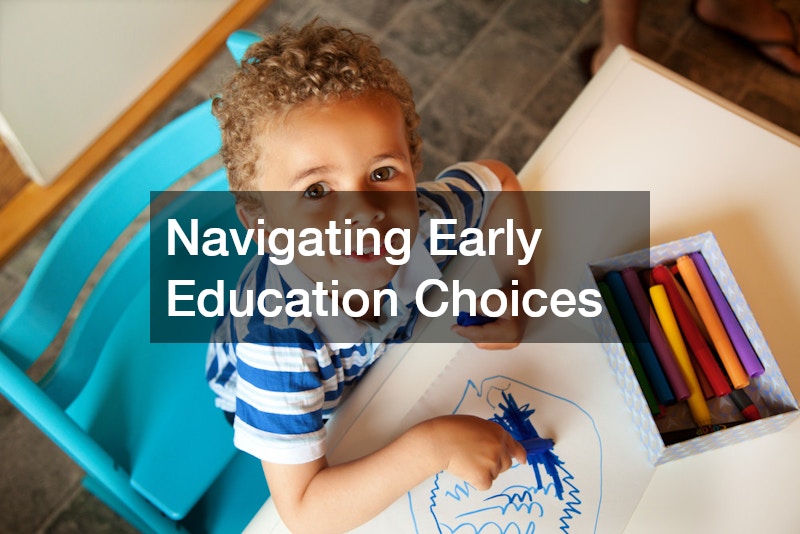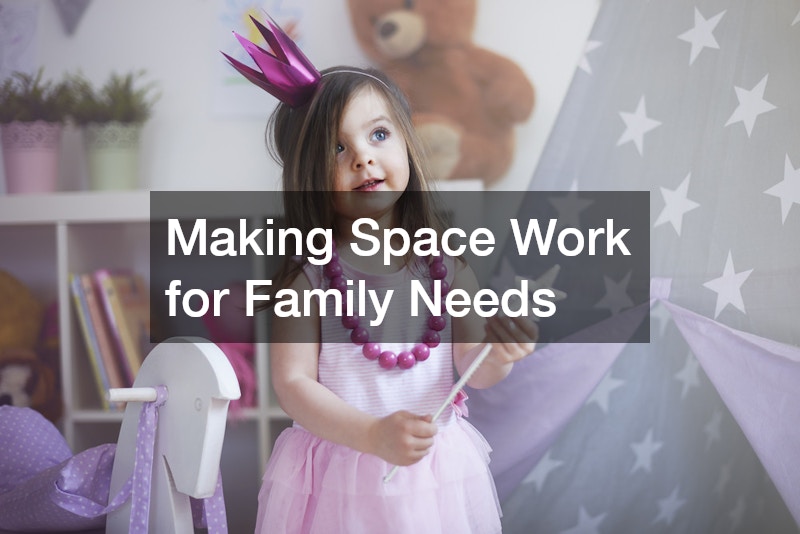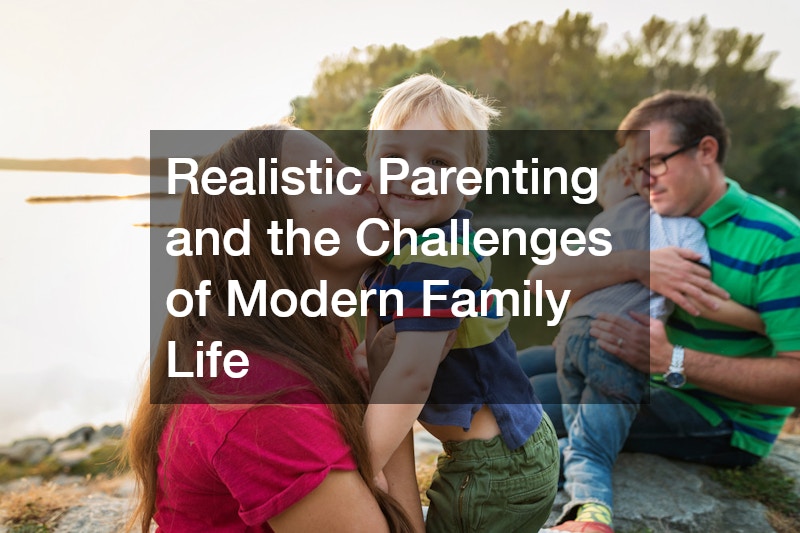Parenting is a journey filled with numerous decisions that shape not only the future of your children but also the dynamics of your household. What makes this journey particularly challenging is the need to adapt and evolve with your children’s growth. Each stage of their early years comes with its unique set of challenges and triumphs, prompting parents to consider choices that will best support their children through crucial developmental phases. Often, the pursuit of perfect parenting advice is quickly overshadowed by the realization that there is no one-size-fits-all solution. Instead, realistic parenting emphasizes a balance between ideal aspirations and practical solutions, allowing parents to focus on what genuinely works for their family.
Understanding the options available for early education, healthcare, and home environment improvement can aid parents in making informed decisions. Conversations around parenting often highlight the necessity for adaptation and personalized approaches, tailoring choices to meet a child’s unique needs. By focusing on parenting techniques, such as gradually introducing structure and encouraging practical habits, families can foster an environment conducive to growth, learning, and well-being.
This article seeks to delve into various aspects of parenting that require careful consideration, offering a comprehensive guide to help parents navigate these decisions gracefully. Covering topics from early education choices to healthcare considerations and home improvements, the goal is to empower parents with the knowledge and insights necessary to support their children and household. Each section builds upon this foundational idea of realistic parenting, presenting solutions and alternatives geared toward simplified yet effective parenting. Understanding that each child and family is unique allows for a more nurturing and supportive approach, devoid of unnecessary stress and aligned with practical parenting strategies.
Navigating Early Education Choices

When children reach the age where they are ready for group learning, families face the question of how to introduce them to structured education. Some parents look for programs that emphasize play-based learning, while others want environments with a more academic focus. Schools and centers vary widely in their teaching styles, and deciding which is right for a child can be overwhelming.
Early education programs play a vital role in shaping children’s social skills, problem-solving abilities, and curiosity. Choosing wisely means considering not just the curriculum but also the environment. Small class sizes, supportive teachers, and an atmosphere that encourages exploration often make a significant difference. Parents also need to think about how a program’s values align with their family’s priorities.
Odyssey Preschool is an example of how schools can blend structured academics with hands-on experiences. Programs like this highlight the importance of balancing early literacy and numeracy with play, creativity, and social interaction. For many families, finding a program that fits their child’s personality helps set the tone for positive school experiences in later years.
As parents evaluate options, it becomes clear that the right educational choice is less about following trends and more about recognizing what will best support a child’s development. By visiting programs, talking with educators, and observing the classroom environment, families can make decisions that foster both learning and confidence.
Understanding Growth and Milestones
Child development is a dynamic process featuring various milestones that signal growth in physical, cognitive, and emotional areas. A key aspect of realistic parenting is monitoring these milestones without excessive pressure or unrealistic expectations. Understanding typical developmental markers allows parents to support their child’s progress effectively.
While it’s natural to compare children, realistic parenting advocates for recognizing that each child’s growth pattern is unique. This understanding fosters a more supportive and nurturing environment, where children feel secure to develop at their own pace. Parents can encourage developmental activities that promote learning and do not rush or overwhelm their children.
Communicating with pediatricians or child development specialists offers additional guidance and reassurance. Maintaining open communication channels helps parents feel equipped to address any concerns about their child’s development.
Building Healthy Habits from the Start
Children’s health doesn’t stop with regular doctor visits—it also includes habits that will follow them into adulthood. Oral health is one area where prevention and consistency pay off significantly. Early education about brushing, flossing, and avoiding excessive sugar can help kids maintain strong teeth and healthy gums.
Introducing children to a pediatric dentist early helps establish positive associations with dental care. These professionals specialize in making visits less intimidating and teaching kids how to care for their teeth in ways they can understand. Preventive treatments, like fluoride applications and sealants, also provide added protection as permanent teeth emerge.
By creating routines around brushing and modeling these behaviors at home, parents reinforce the importance of oral health. Over time, these routines become second nature, giving children a foundation for lifelong wellness. Addressing dental needs early also prevents many problems that can cause discomfort or require costly procedures later in life.
Creating Positive Experiences in Healthcare Settings

Children’s interactions with healthcare providers can shape their views on medical care. Ensuring these experiences are positive is a significant concern in realistic parenting. Collaborative approaches involving parents, pediatricians, and other professionals can help demystify medical environments.
Dental offices, in particular, offer a familiar setting where children can gradually adjust to healthcare routines. Using techniques such as introducing dental care through storybooks or play can help build comfort and familiarity. Parenting highlights the importance of creating a supportive atmosphere where healthcare visits are not feared but understood as part of a healthy lifestyle.
Regular communication with healthcare professionals can further alleviate any anxieties parents or children might experience. By being involved and informed, parents can better advocate for their child’s needs, ensuring experiences are comforting and affirming. This proactive engagement echoes the themes of parenting, focusing on reassuring children about the care they receive.
Supporting Confidence Through Subtle Solutions
As children grow, some begin to feel self-conscious about their appearance, especially when it comes to their teeth. Misalignment can affect not just oral health but also confidence. Families often weigh whether and when to consider corrective options.
Teeth aligners have become an appealing alternative to traditional braces. They offer discreet, comfortable solutions that allow children and teens to improve their smile without the stigma often associated with metal brackets. For many, the subtle nature of these treatments reduces anxiety about appearance during a sensitive stage of life.
Parents considering these options should consult with orthodontic professionals to determine the right timing and approach. Beyond aesthetics, correcting alignment issues early can prevent larger dental challenges in the future. Supporting children through this process requires sensitivity and reassurance, helping them see the benefits rather than focusing on the challenges.
Finding the Right Care for Everyday Concerns
When it comes to managing children’s health, having a trusted pediatrician is invaluable. Realistic parenting includes establishing a relationship with a healthcare professional who understands your family’s needs and provides comprehensive care. Having a reliable pediatrician allows parents to address health concerns promptly and effectively.
Regular health check-ups play a critical role in monitoring a child’s physical and emotional development. During these visits, pediatricians can provide guidance on nutrition, exercise, and other wellness practices. Realistic parenting emphasizes keeping an open dialogue with healthcare providers, ensuring parents feel confident in their ability to support their child’s growth.
Moreover, a strong relationship with a pediatrician can provide parents with peace of mind. Knowing there is a supportive and knowledgeable professional available reassures parents that help is always at hand. This security forms an important part of the realistic parenting approach, equipping families to navigate each stage of development with confidence.
Making Space Work for Family Needs

Homes must adapt as children grow, and sometimes this means rethinking how space is used. Families often find that they need more room for play, study, or storage. Transforming underutilized areas can be a practical solution.
A basement refinish, for instance, can turn a seldom-used area into a functional family space. Whether it becomes a playroom, study zone, or quiet retreat, creating designated areas supports smoother daily routines. For families with multiple children, having separate spaces helps reduce conflicts and encourages independence.
These projects also allow parents to align the home environment with their children’s needs at different stages. Making space work for the whole family reflects the ongoing adjustments that raising kids often requires.
Encouraging Nutritious Eating in Daily Routines
Nutrition is a cornerstone of healthy growth, yet it’s often one of the toughest battles families face. Busy schedules, picky eaters, and the availability of processed foods all add to the challenge.
Vegetables are an essential part of children’s diets, but getting kids excited about them can take creativity. Involving children in meal preparation, offering a variety of choices, and modeling positive attitudes toward food can help shift perspectives. Families who introduce vegetables in fun, appealing ways often see better success over time.
It’s also important to avoid turning meals into battles. Encouragement, patience, and small changes often make a bigger difference than rigid rules. By making healthy eating a consistent part of family routines, parents set the stage for lifelong wellness.
Ensuring Safe and Clean Essentials at Home
Maintaining a healthy and clean environment at home is a key priority for parents. Water filtration systems play a crucial role in ensuring the availability of safe drinking water, contributing to family well-being. Realistic parenting emphasizes the importance of such practical solutions in promoting a healthy lifestyle.
The benefits of a water filtration system extend beyond drinking water, encompassing cooking and cleaning as well. Parents can feel confident in the quality of fluids their children consume and use. By addressing this essential aspect of home safety proactively, families foster a sense of security and health consciousness.
Choosing the right filtration system involves understanding family needs and the local water supply characteristics. By staying informed and considering potential improvements, parents ensure the ongoing health and safety of their household. Realistic parenting supports these informed choices, encouraging families to prioritize accessible, effective solutions for everyday concerns.
Providing Comfort With Tailored Solutions

Every child is unique, and for some families, this means adapting living spaces and routines in specific ways. Finding solutions that address individual needs ensures both comfort and functionality.
A bed for special needs child, for example, may offer features like additional support, safety rails, or custom adjustments that provide security and peace of mind. Such investments help children feel secure while also easing parents’ concerns about safety.
Tailored solutions highlight the fact that parenting isn’t one-size-fits-all. Adjustments made with love and attention to detail create environments where every child feels supported, valued, and cared for.
Parenting in today’s world is a constant balancing act, requiring families to juggle education, health care, nutrition, and home management while also preserving emotional connections. The journey is filled with decisions that affect not only the present but also the long-term well-being of children. Every stage brings both joys and challenges, reminding parents that flexibility and adaptability are essential.
One of the biggest lessons families learn is that perfection isn’t the goal. What matters most is building a strong, supportive environment where children feel safe to grow, explore, and make mistakes. Encouraging curiosity, maintaining healthy routines, and creating a home where children know they are valued can often be more impactful than following rigid rules or outside expectations.
This is where a grounded approach to parenting becomes vital. Rather than chasing unattainable ideals, families who embrace practical parenting focus on progress, patience, and solutions that truly fit their lives. It allows parents to meet challenges with resilience, to accept that mistakes happen, and to recognize that children learn as much from small struggles as they do from big victories.
Through this approach, families can tackle education with open minds, health care with trust, and nutrition with consistency. It helps parents see that adapting spaces at home or finding tailored solutions is not about keeping up with others but about making thoughtful choices that work for their unique family.
As children grow, the guidance of steady parenting provides them with stability while also giving them the freedom to develop independence. Parents who practice it discover that the strength of their family comes not from doing everything perfectly but from doing their best with love and intention.
In the end, a practical parenting style reminds us that raising children is not a sprint but a lifelong journey. By focusing on what matters most and letting go of unnecessary pressures, families can create environments where both children and parents thrive. It is this steady, thoughtful approach that transforms everyday challenges into opportunities for growth, connection, and lasting joy.
